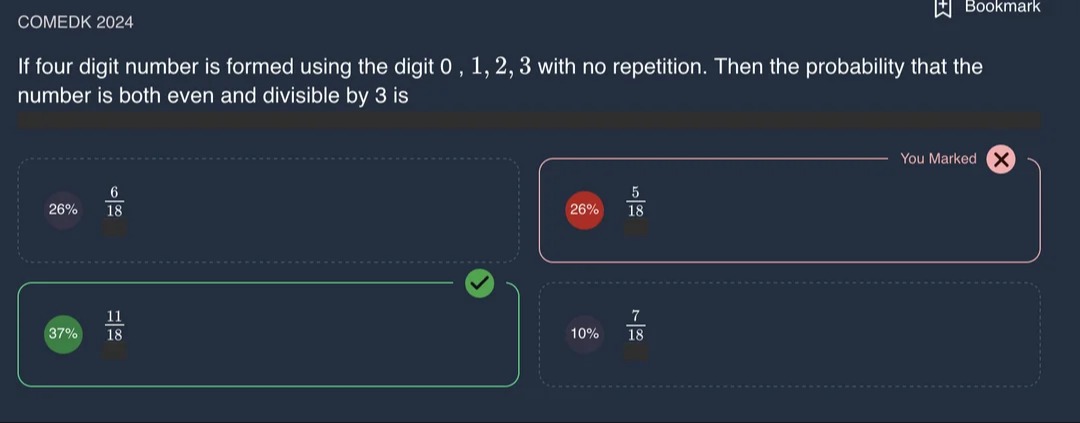Question
Question: If four digit number is formed using the digit 0, 1, 2, 3 with no repetition. Then the probability t...
If four digit number is formed using the digit 0, 1, 2, 3 with no repetition. Then the probability that the number is both even and divisible by 3 is

186
185
1811
187
95
Solution
We form a 4-digit number using the digits 0, 1, 2, 3 with no repetition. Note that since all 4 digits are used, the digit-sum is
0+1+2+3=6,
which is divisible by 3. Thus every such number is divisible by 3. So the only extra condition that has to be checked is that the number is even (i.e. its units digit is even).
Step 1. Total number of 4–digit numbers
The thousands (first) digit cannot be 0. There are 3 choices (1, 2, or 3). After choosing the thousands digit, the remaining 3 digits can be arranged in any order. Hence, the total numbers are
3×3!=3×6=18.
Step 2. Count how many of these numbers are even
A number is even if its last digit is even. Among the digits 0, 1, 2, 3 the even digits are 0 and 2.
-
Case 1: Last digit is 0
- The thousands digit can be chosen from {1, 2, 3} → 3 ways.
- The remaining 2 digits can be arranged in 2! ways → 2 ways.
- Total for this case: 3×2=6.
-
Case 2: Last digit is 2
- The thousands digit cannot be 0 and also cannot be 2 (since it’s used in the units place). So the thousands digit must be chosen from {1, 3} → 2 ways.
- The remaining 2 digits (from {0, the unused digit from {1,3}}) can be arranged in 2! ways → 2 ways.
- Total for this case: 2×2=4.
Thus, the total even numbers = 6+4=10.
Step 3. Calculate the probability
Since every one of the 18 numbers is divisible by 3, the probability that a randomly chosen number is both even and divisible by 3 is the probability that it is even:
P=1810=95≈55.56%.
Conclusion:
The correct probability is 95 (approximately 55.56%). None of the provided options (namely, 186, 185, 1811, or 187) matches this answer.
